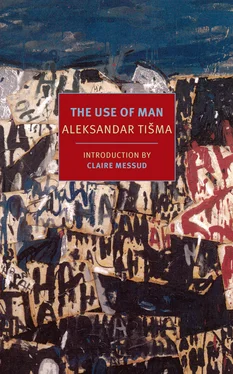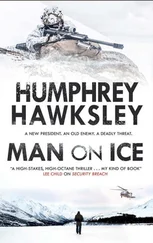Aleksandar Tišma - The Use of Man
Здесь есть возможность читать онлайн «Aleksandar Tišma - The Use of Man» весь текст электронной книги совершенно бесплатно (целиком полную версию без сокращений). В некоторых случаях можно слушать аудио, скачать через торрент в формате fb2 и присутствует краткое содержание. Год выпуска: 2014, Издательство: NYRB Classics, Жанр: Современная проза, на английском языке. Описание произведения, (предисловие) а так же отзывы посетителей доступны на портале библиотеки ЛибКат.
- Название:The Use of Man
- Автор:
- Издательство:NYRB Classics
- Жанр:
- Год:2014
- ISBN:нет данных
- Рейтинг книги:5 / 5. Голосов: 1
-
Избранное:Добавить в избранное
- Отзывы:
-
Ваша оценка:
- 100
- 1
- 2
- 3
- 4
- 5
The Use of Man: краткое содержание, описание и аннотация
Предлагаем к чтению аннотацию, описание, краткое содержание или предисловие (зависит от того, что написал сам автор книги «The Use of Man»). Если вы не нашли необходимую информацию о книге — напишите в комментариях, мы постараемся отыскать её.
A work of stark poetry and illimitable sadness,
is one of the great books of the 20th century.
The Use of Man — читать онлайн бесплатно полную книгу (весь текст) целиком
Ниже представлен текст книги, разбитый по страницам. Система сохранения места последней прочитанной страницы, позволяет с удобством читать онлайн бесплатно книгу «The Use of Man», без необходимости каждый раз заново искать на чём Вы остановились. Поставьте закладку, и сможете в любой момент перейти на страницу, на которой закончили чтение.
Интервал:
Закладка:
The column was still inching along in the same thick confusion of people and objects. Jovan had to wait for an opening in the stream, and as a horse harnessed to a cart lost its footing, he quickly moved in among the pedestrians and the vehicles. But they went even more slowly than the day before, because exasperation had made the men irritable, stubborn, and no one would give way to anyone else. The faces that peered in the car windows were no longer indifferent or curious, but hostile; their eyes, narrowed from lack of sleep, glared at the passengers with suspicion and hatred. Oppressed by this hatred, they drove on, almost holding their breath, and passed through occasional villages until dusk, when they finally reached the embankment, which teemed like a fairground with unharnessed, agitated horses, loaded carts, and milling hordes of people in uniform and in civilian clothes. As soon as he was paid, Jovan took his leave curtly, unpleasantly; restarting the engine, he turned the taxi around and disappeared in the dust made rosy by the twilight.
The three Lazukić men picked up their suitcases and clambered onto the embankment. In front of them were woods swarming with human figures, and beyond, wide and dark, the glistening surface of the river. They walked down the embankment and through the woods, stumbling over roots and the legs of people stretched out on the ground, and emerged at the water’s edge, where they stopped to wait. On the other side of the gently flowing river, the far bank could be made out, black with vegetation under the pink vault of the sky. Nemanja Lazukić turned to the man next to him and asked about the ferry. With a listless hand the man pointed to a small dark shape that was in the process of detaching itself from the opposite shore. As if responding to a signal, the people around them got to their feet and, jostling for position, moved. Carried by this human current, Lazukić and his sons came up against an impenetrable wall of backs. Anxiously they watched the ferry approach slowly and finally, fifty paces to the right, touch ground. The crowd swung forward, which brought them ten paces closer to the place of embarkation. But the forty remaining paces were an impassable barrier. Worn out, they put down their suitcases and sat on them.
It took six crossings — three quarters of an hour each — before they reached the wooden landing, where with great effort they managed to elbow their way up the gangplank and onto the ferry. Greatly relieved, as if they had escaped a fire, they glided over the water, propelled by the boatman’s long oars, to the Serbian side. There they found no smaller a crowd; pushed, shoved, and cursed at, tripping in the darkness, they proceeded slowly along a muddy road until they reached the town. They had hoped to find a place to stay the night, but everyone else had the same idea, and at the few lighted houses there was a departing stream of people who had already been turned away. Only the spacious railroad station was open to them, and there they collapsed, keeping close together, on the stone floor of the waiting room. Through the night they were wakened by newcomers, who stepped on them and pushed them closer to the wall. They dozed fitfully until the cold April dawn.
Hungry, they set out to look for food, but could not get near the inns, all besieged by crowds. They saw people carrying bread, and following the trail of this shining brown burden under so many arms, they found a bakery, which by some miracle was ignoring the war. In front of it, a mob pushing and fighting. While Rastko took care of the suitcases, sitting on them with his head bowed, Nemanja and Sredoje plunged into the battle for bread. They were the last to be served, and emerged with two loaves. They devoured them right there on the street, quenching their thirst with water from a fountain in a deserted marketplace, then picked up their suitcases and continued on their way. They came to a field not far from the town and paused to regain their breath. Nearby was a peasant cart with horses harnessed to it, and next to it a fire crackled; a mustachioed NCO was burning papers that two soldiers handed him from a chest.
Nemanja Lazukić walked over and started a conversation. The NCO, the orderly of a battalion in retreat, had just been told to destroy all confidential papers and was burning what he could before moving on. Lazukić asked if he could load their suitcases on the cart; the NCO hesitated but finally agreed. The cart rolled onto the road, and Lazukić and his sons walked in step behind it, staring at their suitcases; they identified now with the soldiers who the day before had glared at them as they sat uneasily in Jovan’s taxi. Now they, too, were preoccupied with the road on which they trod, its bumps, holes, dust, and piles of horse droppings.
They were tired; Rastko began to limp. Stopping at the side of the road, they hurriedly removed his left shoe and sock and found that he had a large red blister on his heel. The father scolded his son for carelessness in the choice of shoes, mentioned the mother’s negligence and the family’s failure to understand the harsh realities of war. But Rastko limped no less after these reproaches than before and began to drop behind. Lazukić was obliged to negotiate once again with the NCO, who glanced at the youngster and motioned to him indifferently to climb onto the cart. Now Rastko’s legs dangled over the side, between the slats, his eyes penitently glued to the road.
There was a rumbling of engines in the air, and as heads turned up to look for the source of the noise, aircraft appeared in the cloudless sky like huge birds and cast their shadows across the road. A rain of bullets ripped into things and people. The column scattered into the fields on either side of the road; the horses, frightened, began to trot. Sredoje jumped over a ditch into a plowed field and ran, and when the roaring of the planes grew louder, he lay on his stomach pressing against the warm, soft, freshly turned earth. In dismay he watched as the bullets approached; he was sure they were coming straight for him, and his heart missed a beat, but the shooting quickly subsided and he was unhurt. He raised his head and saw the road empty all the way to the next bend, where a white horse, free of its harness, was dragging behind it a purplish braid suspended from its torn belly.
A second wave of planes came over, a third; then there was silence. Not at all sure that the danger had passed, people rose from the field slowly, hesitantly, like animals awakening. Sredoje, too, got to his feet, listened for a while, heard nothing, and walked back to the road. He saw his father emerging from the ditch, looking at his feet. “Are you all right?” Sredoje asked. “Yes, I think so,” answered the lawyer, “but my feet are wet through.” He climbed onto the road, took several steps — with each step water squished from his low shoes — then sat on a milestone, unlaced his shoes, removed them, peeled off his socks, and wriggled his white toes. “Where are the suitcases?” But the road was deserted, the cart with the suitcases and Rastko long since gone. Lazukić thought for a moment, then felt in his pockets, took one white handkerchief from his coat and another from his trousers, wrapped them around his feet, turned his shoes upside down to drain the water out, and put them on again. “Like socks!” he said, almost with satisfaction, and walked, at first with an uncertain step, then more confidently, his calves bared and the white handkerchiefs flapping, their corners dragging on the ground and rapidly turning gray. “Hurry! We must catch up with Rastko.”
They continued along the road, and only there, from a higher vantage point, noticed the destruction that the machine guns had left behind. At the edge of the road, next to a knapsack, an officer in an overcoat, bareheaded, was lying on his back, his arms and legs spread out as if he were asleep. Farther down the road, a white horse was dying, rolled to one side, its head jerking convulsively, its powerful hindquarters, caught in the coils of its entrails, kicking. A cart with a field kitchen was on fire; behind it two soldiers were kneeling, bent over a third, who lay groaning on the ground.
Читать дальшеИнтервал:
Закладка:
Похожие книги на «The Use of Man»
Представляем Вашему вниманию похожие книги на «The Use of Man» списком для выбора. Мы отобрали схожую по названию и смыслу литературу в надежде предоставить читателям больше вариантов отыскать новые, интересные, ещё непрочитанные произведения.
Обсуждение, отзывы о книге «The Use of Man» и просто собственные мнения читателей. Оставьте ваши комментарии, напишите, что Вы думаете о произведении, его смысле или главных героях. Укажите что конкретно понравилось, а что нет, и почему Вы так считаете.












